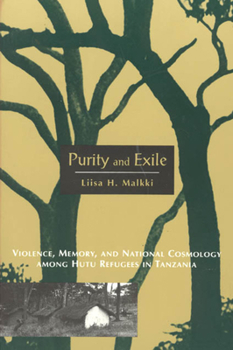Purity and Exile: Violence, Memory, and National Cosmology among Hutu Refugees in Tanzania
Select Format
Select Condition 
Book Overview
In this study of Hutu refugees from Burundi, driven into exile in Tanzania after their 1972 insurrection against the dominant Tutsi was brutally quashed, Liisa Malkki shows how experiences of dispossession and violence are remembered and turned into narratives, and how this process helps to construct identities such as "Hutu" and "Tutsi." Through extensive fieldwork in two refugee communities, Malkki finds that the refugees' current circumstances significantly influence these constructions. Those living in organized camps created an elaborate "mythico-history" of the Hutu people, which gave significance to exile, and envisioned a collective return to the homeland of Burundi. Other refugees, who had assimilated in a more urban setting, crafted identities in response to the practical circumstances of their day to day lives. Malkki reveals how such things as national identity, historical consciousness, and the social imagination of "enemies" get constructed in the process of everyday life. The book closes with an epilogue looking at the recent violence between Hutu and Tutsi in Rwanda and Burundi, and showing how the movement of large refugee populations across national borders has shaped patterns of violence in the region.
Format:Paperback
Language:English
ISBN:0226502724
ISBN13:9780226502724
Release Date:August 1995
Publisher:University of Chicago Press
Length:374 Pages
Weight:1.16 lbs.
Dimensions:0.8" x 6.0" x 9.0"
Customer Reviews
1 rating
The formation of the Hutu identity
Published by Thriftbooks.com User , 25 years ago
Liisa Malkki is an anthropologist who has done fieldwork within Africa. She writes of past adversities and destruction that the Hutu went through. Despite this, they still maintain an identity while adapting to situations. She discusses what lengths the Tutsi went to in order to elevate their status from minority to the majority (the mass killings/genocide of the Hutu). Malkki's main point in the book is that despite the violence and adversity that the Hutu encountered, they still have a central identity. It is this adversity and mass genocide that played an important role in shaping Hutu culture. At the beginning of the book, Malkki writes about the Hutu and Tutsi "mythico-history" or ethnic conflict. She gives great detail of past violence and reasons behind why it happened. She develops her argument as to why the Hutu who survived the mass killings fled. The identity of the Hutu is what still remains intact whether in Rwanda or Burundi. They are of the Hutu tribe.






